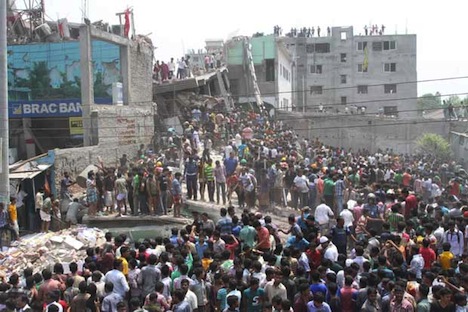On a New York spring day on March 25, a long, long time ago (last decade), constitutional law scholar Noah Feldman was teaching administrative law to a gang of truculent law students when he stopped class in order to take us on a brief walk downstairs from the classroom to the Brown Building, which like everything else in downtown Manhattan, is now part of John Sexton’s growing New York University empire.![]()
The reason was the anniversary of what happened there in 1911 — a fire at the Triangle Shirtwaist Factory, one of the deadliest industrial disasters in U.S. history, which resulted in the deaths of at least 146 workers, many of them young, female and immigrant. The death rate was tragically higher because the factory managers locked access to the stairwells and other exits, so as to prohibit theft. The disaster, which came just five years after the publication of Upton Sinclair’s The Jungle, detailing the unsanitary conditions of the Chicago slaughterhouses, became a major catalyst for a more progressive labor laws, greater employee rights and better workplace conditions. Frances Perkins, who would become perhaps the most well-known U.S. secretary of labor in the 1930s, spearheaded the subsequent investigation into the Triangle Shirtwaist disaster.
I was heartened to learn that, on the day of the fire, NYU law students had helped to pull some of the workers there to safety.
I mention this because of the uncanny similarities to yesterday’s disaster at a garment factory in the nine-story Rana Plaza building in Dhaka that collapsed — like Triangle Shirtwaist Factory 102 years ago in New York City, the building was crowded, the fire doors and other exits were locked, and it’s fast becoming the worst garment industry disaster in Bangladeshi history.
Employees had the unenviable choice of jumping to their deaths or being crushed to death, much like the Triangle Shirtwaist workers who were forced to jump or to burn.
But I can’t help but note that Matthew Yglesias — a commentator that I usually find incredibly thoughtful, especially on all matters economic — wrote one of the lazier pieces of journalism I’ve read yesterday with a 360-word post in Slate on why it’s totes cool that Bangladesh can have collapsing buildings. As it turns out, his piece featured barely one word for each dead Bangladeshi worker — now sadly, the death toll is already 243:
Bangladesh may or may not need tougher workplace safety rules, but it’s entirely appropriate for Bangladesh to have different—and, indeed, lower—workplace safety standards than the United States….
Bangladesh is a lot poorer than the United States, and there are very good reasons for Bangladeshi people to make different choices in this regard than Americans. That’s true whether you’re talking about an individual calculus or a collective calculus. Safety rules that are appropriate for the United States would be unnecessarily immiserating in much poorer Bangladesh. Rules that are appropriate in Bangladesh would be far too flimsy for the richer and more risk-averse United States. Split the difference and you’ll get rules that are appropriate for nobody. The current system of letting different countries have different rules is working fine. American jobs have gotten much safer over the past 20 years, and Bangladesh has gotten a lot richer.
Yglesias is really channeling 18th century economist David Ricardo here, whose concept of comparative advantage still shapes much of international economics today. The idea, for anyone who’s not taken an introductory economics course, is that countries should produce what they are most efficient as producing, produce a lot of it, and trade with other countries for the items that the country could produce less efficiently. So Bangladesh should specialize in the things that it’s best at producing for the lowest cost — and it certainly seems like exporting clothing is one of those things, given that no country, excepting China, exports more clothing to the world.
Yglesias’s point is that it’s perfectly fine for Bangladeshis to specialize in cheap clothing because they’ll be able to produce it at less cost than, say, U.S. or German or Singaporean workers. In that regard, he’s really arguing that Bangladesh’s comparative advantage is in cheap labor, and that’s of course a well-worn path for relatively poorer countries to become relatively richer countries — that was true in the United Kingdom in the 18th century, the United States in the 19th century, South Korea in the late 20th century. Government regulation — whether that’s environmental regulation in China or workplace regulation in Bangladesh — adds additional costs to industry, it’s true, and that reduces the comparative advantage Bangladesh has in cheap labor. That’s why Yglesias is arguing that it makes sense for Bangladesh to have lower workplace safety standards.
But Yglesias really doesn’t get the fundamental facts right — it appears that if the factory workers had listened to local regulators, who spotted the cracks in the building Tuesday, they would have never allowed their workers back into the factory in the first place, which has more to do with a culture of impunity and shady legal practices, not comparative advantage:
Continue reading Matthew Yglesias’s callous 360-word post is wrong about Bangladesh

